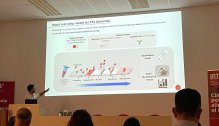Innovative Detection of Marine Toxins presented at the XXVIII Transfrontier Meeting on Sensors and Biosensors
Ulises Diaz presented an oral communication at the XXVIII Transfrontier Meeting on Sensors and Biosensors last week at IRTA, showcasing the development of a novel paper-based rapid test for detecting the small marine toxin tetrodotoxin (TTX) using an antibody-aptamer hybrid sandwich assay. This device aims to limit poisoning cases after ingestion, providing a fast, sensitive, and robust tool for point-of-need screening of contaminated food stocks.
Why This Matters: Tetrodotoxin is a highly toxic marine compound found in Pufferfish and seafood, responsible for frequent global intoxications. Cooking does not destroy TTX, and ingestion can cause severe symptoms due to its ability to block sodium channels and impair nerve function. With no antidote available, rapid detection is crucial to prevent poisoning incidents.
Key Features of the Test:
- Fast and Sensitive: Achieves a visual limit of detection of 0.3 ng/mL TTX in less than 20 minutes.
- Robust and Reliable: Demonstrates high stability and specificity, validated with contaminated puffer fish samples.
- Innovative Approach: First sandwich-assay for TTX, significantly improving detection limits compared to existing tests.
This breakthrough highlights the potential of lateral flow assays (LFAs) in providing cost-efficient, equipment-free, and rapid diagnostics for marine toxins, ensuring food safety and public health.

